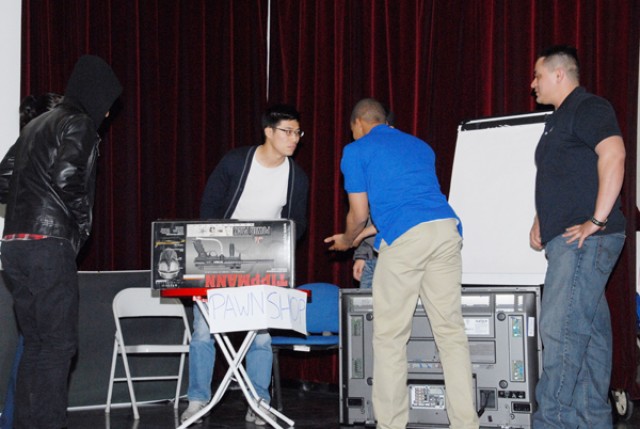
USAG Casey, South Korea - Members of the Warrior Country community came together for an entire week on issues they had concerning Area I during the Army Family Action Plan Conference Dec. 15-17 in the U.S. Army Garrison Casey Community Activities Center.
The Army Family Action Plan gives Soldiers, Retirees, Family members and Civilians a voice in improving their standards of living for the 2nd Infantry Division and USAG Red Cloud.
Early on in the year, Charles Lyons, garrison AFAP manage, rused program criteria to gauge whether the issues presented have a measurable end product, accurate facts or if it is a policy, regulation, program and facility changing issue to be used in the AFAP conference.
Once the issues were chosen for the delegates, they were then separated into four very specific and unique focus groups: force support, family services, single Soldiers and for the first time in the history of the Warrior Country AFAP conference, a teen work group.
"We are increasing the number of our families in Korea at expediential numbers and in the next five years we will have more than 10,000 family members in Korea," said Maj. General Michael Tucker, 2nd Infantry Division commander.
Early in the morning the delegates met for breakfast at the USAG Casey Gateway Club with the 2nd Infantry Division and garrison-level chain of command. Col. Larry "Pepper" Jackson, USAG Red Cloud commander, and Tucker each gave opening remarks on how important AFAP is to the Army, U.S. Forces Korea and Area I. Jackson noted how far Area I has come, paying respect to leaders that came before himself and Tucker saying, "we are really reaping the benefits of their success, but we must continue to bridge the gap from where we are now to the future ahead of us."
"You represent the best part of us and your comments, ideas and thoughts help shape the very community in which we live and grow," Tucker said, speaking of the pivotal role each delegate holds in Area I. "Leave no stone unturned, there is a cluster of issues you can solve."
The committee had more than 15 issues for the delegates to discuss, and by Dec. 17, each group reduced the issues to only two to present to the chain of command and provide a skit for one issue.
The single Soldier work group briefed crime prevention in Soldiers barracks. They found current security provisions are ineffective in deterring and preventing crimes in barracks. Crimes like larceny, sexual assault, harassment, underage drinking and other crimes adversely impact morale. Their recommendations to solving the issue: install surveillance cameras inside the barracks and self locking doors on all rooms.
The force support group presented a skit dealing with two issues - parking at the USAG Casey Post Exchange and business hours of the commissary.
At the end of the performance, from more than 80 designated parking spots, less than one quarter of the parking spots were left for the Soldiers and Family members. One Soldier added how she needed to find a parking spot quickly before the commissary closes because their hours are not suitable for Soldiers. She parked illegally and now has a ticket because of the parking issue and commissary hours. The recommendations were to extend the hours of the commissary for early bird shoppers and add more parking spots.
In the next skit, a mother walked inside the Troop Medical Clinic at USAG Red Cloud with infant twins and an older child. The mother explained to the physician her children needed to receive vaccinations before starting school. The physician apologized and stated the garrison does not currently have a pediatrician on staff right now.
The skit demonstrated a lack of readily available child healthcare on post. The recommendations made by the group were to have a full time pediatrician on staff at Red Cloud or for the pediatrician stationed at Casey to have some business hours at Red Cloud.
The final issue for the AFAP conference was presented by the teen group, which highlighted troubles teens go through in using military-provided post-to-post transportation.
They explained many middle-school and high-school students participate in extracurricular activities outside of school hours, and although the Army provides an activity bus at a reduced cost for children, it has no effect on them because all middle-school and high-school students must pay an adult fare to ride the bus.
The group recommended to the chain of command they provide reduced or no cost student fares for middle and high-school students.
Jackson and Tucker, during remarks about the issues, agreed each concern needed individual attention and were serious matters within Area I.
Every issue will go into discussion, with all that are not resolved at the garrison level being taken up to appropriate channels at the USFK and 8th Army AFAP conferences being held in January and April.

Social Sharing